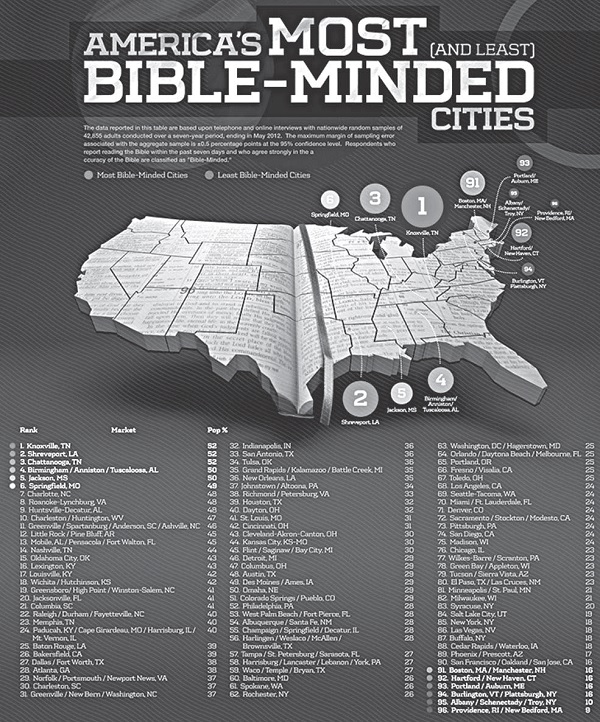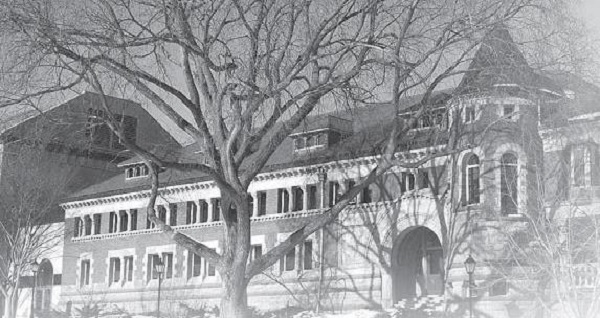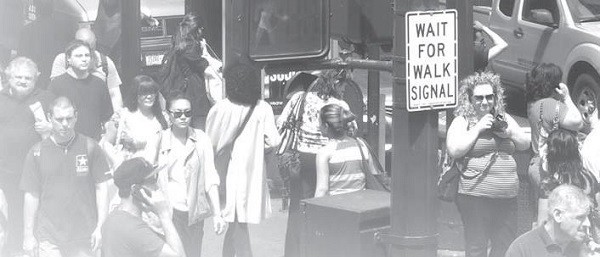Watching the Heart of the City
Barna Group’s analysis of rankings of Bible respect and practice in U.S. cities

▲More than half of the population in Northville, Tennessee, practices and respects biblical teachings, ranking first in the Bible-minded rankings surveyed by Barna Group.
(Image source: http://getawaysforgrownups.com/wp-content/uploads/2013/04/Downtown-Knoxville-Panoramic.jpg)
From its place in schools, to public places, and even personal lives, the current and future role of the Bible in American society has always been a controversial topic. A newly released survey from the Barna Group shows how the issue presents itself geographically and explores views on the Bible in ninety-six metropolitan areas across the country.
By examining urban residents' views on the Bible, Barna ranked the cities' "Bible-mindedness" in the report. This survey report was commissioned by the American Bible Society, based on 42,855 personal interviews, and analyzed "Bible trends." If individual interviewees state that they read the Bible regularly every week and firmly believe that the principles taught in the Bible are correct, they are considered to be biblically minded. This definition targets behaviors and attitudes—the person both practices and honors Christian scripture. The rankings therefore reflect the acceptance or resistance of residents of major American cities to the Bible.

▲Bible-loving ranking of American cities
(Image Source:http://cities.barna.org/americas-most-and-least-bible-minded-cities/)
Top cities
Regionally speaking, the American South can still be called the most biblically minded. The top cities, all of which have at least half of their residents meeting the definition of Bible-minded, are located in the southern United States. The top three cities include Northville, Tennessee, Waterford, Louisiana, and Chattanooga, Tennessee. The remaining cities in the top ten are shown in Table 1.
Table 1 Top ten cities
| 1 | northville | Knoxville | Tennessee | Tennessee | 52% |
| 2 | Shuifubo | Shreveport | Louisiana | Louisiana | 52% |
| 3 | chattanooga | Chattanooga | Tennessee | TN | 52% |
| 4 | Birmingham | Birmingham | Alabama | Alabama | 50% |
| 5 | jackson | Jackson | mississippi | Mississippi | 50% |
| 6 | Springfield | Springfield | Missouri | Missouri | 49% |
| 7 | charlotte | Charlotte | North Carolina | North Carolina | 48% |
| 8 | linqibao | Lynchburg | Virginia | Virginia | 48% |
| 9 | Huntsville-Decat | Huntsville-Decatur | Alabama | AL | 48% |
| 10 | charlestown | Charleston | west virginia | WV | 47% |
Respect the last city
The cities at the bottom of the rankings are scattered across different regions, but are more concentrated in New England (the northeastern United States). The cities with the lowest Bible-mindedness scores were Providence, Rhode Island, and Albany, New York. Comparatively speaking, the city that respects the Bible the most has five times as many residents who can be called Bible-minded as the two cities in the Northeastern United States mentioned above.
Even if these two cities are extreme, none of these cities in the bottom dozen have exceeded the 20% mark, which means that no more than one-fifth of the population can be considered Bible-minded. Most of the ten cities at the bottom are located in New England (see Table 2 for details).
Other cities at the bottom of the list are mainly in the western United States, including San Francisco in California, Phoenix in Arizona, and the casino city of Las Vegas in Nevada. As for Cedar Rapids, located in the Midwestern state of Iowa, it can be said to be an outlier (see Table 2 for details).
Trends in large, densely populated states
Many cities in New York State, like much of New England, tend to be at the bottom of the Bible-minded rankings. As for the other three densely populated states, the survey revealed the following pattern─
Table 2 The last eleven cities
| 85 | New York City | New York | New York state | New York | 18% |
| 86 | las vegas | Las Vegas | Nevada | Nevada | 18% |
| 87 | buffalo | Buffalo | New York state | New York | 18% |
| 88 | cedar rapids | Cedar Rapids | Iowa | Iowa | 18% |
| 89 | Phoenix city | Phoenix | Arizona | Arizona | 17% |
| 91 | boston | Boston | Massachusetts | Massachusetts | 16% |
| 92 | Hartford | Hartford | connecticut | Connecticut | 16% |
| 93 | portland | Portland | maine | Maine | 16% |
| 94 | burlington | Burlington | Vermont | Vermont | 16% |
| 95 | albany | Albany | New York state | New York | 10% |
| 96 | providence | Providence | rhode island | Rhode Island | 9% |

▲ Providence, Rhode Island, ranks at the bottom of the Bible-minded rankings, and the city’s Ivy League school, Brown University, was originally founded by a Baptist pastor. Nowadays, the school spirit has changed and is completely different from the original intention of the founder.
(Image source: http://farm4.staticflickr.com/3094/3237887972_f589789a6d_o.jpg)
Table 3 Northern Florida ranks higher
| 13 | Pensacola/Mobile | Pensacola/Mobile | 45% |
| 20 | jacksonville | Jacksonville | 41% |
| Southern Florida ranks lower | |||
| 53 | west palm beach | West Palm Beach | 28% |
| 57 | Timber─St. Petersburg | Tampa-St. Petersburg | 27% |
| 64 | orlando | Orlando | 25% |
| 70 | Miami | Miami | 24% |
Table 4 The current situation of major towns in California is worrying
| 26 | Bakerfield | Bakersfield | 39% |
| 66 | Fosno/Visali | Fresno/Visalia | 25% |
| 68 | Los Angeles | Los Angeles | 24% |
| 72 | sacramento | Sacramento | 24% |
| 74 | San Diego | San Diego | 24% |
‧ Florida:Despite its southern location, most of the major cities on the Florida peninsula rank in the middle or bottom of the Bible-minded rankings. Including West Palm Beach, St. Petersburg, Orlando, and Miami (see Table 3 for details). Cities in northern Florida are exceptions to this pattern, such as Pensacola/Mobile and Jacksonville. These two cities are more consistent with the trend of southern states, and are more likely to reflect the trend of local Florida or southern population. Compared with other cities in South Florida, there are fewer residents who have moved in from other places (see Table 3 for details). ).
‧ California:With the exception of San Francisco, which is among the bottom three, most major California cities are in the bottom third. Los Angeles represents the constant among California cities, with 24% of its residents being Bible-minded (ranking 68th out of 96 cities). San Diego, Sacramento, and Fasno/Visali are also clustered within this area. However, Bakersfield is unique and has become one of the most Bible-minded cities in several Pacific coast states (see Table 4 for details).
‧ Texas:Texas, which belongs to the traditional "Bible Belt", is consistent with this trend, with most major cities in the top half of the Bible-minded rankings. Dallas/Fort Worth is the most Bible-minded city in Texas (38%, 27th place), higher than St. Anthony, Houston and Austin (see Table 5 for details). There are a few notable exceptions, such as Harlingen/Viralco/McEllen/Brownsville-Waco, and most notably, El Paso (see Table 5 for details). These cities may have higher rates of Hispanic Catholic residents, who have historically been less likely to use the Bible, leading to out-of-norm results.
Table 5 Dezhou cities vary greatly
| 27 | Dallas/Fortune | Dallas/Fort Worth | 38% |
| 33 | saint antony | San Antonio | 36% |
| 39 | Houston | Houston | 32% |
| 48 | austin | Austin | 29% |
| 56 | Harlingen/Viralco/McEllen/Brownsville | Harlingen/Weslaco/McAllen/Brownsville | 28% |
| 59 | waco | Waco | 27% |
| 80 | el paso | El Paso | 23% |
Where is the heart of the city?
Of the thirty largest cities in the United States, ten are in the top half of the Bible-heart ranking, while the remaining twenty are in the bottom half. Generally speaking, the more densely populated an area, the greater the tendency to move away from the Bible. Only three of the most Bible-minded cities are among the 30 metropolitan areas: Charlotte (No. 7), Nashville, Tennessee, and Raleigh/Durham, North Carolina. The other twenty-two cities with high Bible Heart rankings all have less than one million households (see Table 6 for details).
Table 6. Among the thirty metropolitan areas in the United States, only three are the most Bible-minded.
| 7 | charlotte | Charlotte | North Carolina | North Carolina | 48% |
| 14 | nashville | Nashville | Tennessee | Tennessee | 44% |
| 22 | Raleigh/Durham | Raleigh/Durham | North Carolina | North Carolina | 40% |
There are still many cities with a biblical heart among the metropolitan areas, including Dallas/Fortune at 27th, Atlanta at 28th, Indianapolis at 32nd, and Indianapolis at 39th. Houston, No. 41 St. Louis, No. 43 Cleveland and No. 46 Detroit (see Table 7 for details).
Table 7 Metropolises that are otherwise acceptable
| 27 | Dallas/Fortune | Dallas/Fort Worth | Texas | Texas | 38% |
| 28 | Atlanta | Atlanta | Georgia | GA | 38% |
| 32 | Indianapolis | Indianapolis | Indiana | IN | 36% |
| 39 | Houston | Houston | Texas | Texas | 32% |
| 41 | saint louis | St. Louis | Missouri | MD | 31% |
| 43 | cleveland | Cleveland | Ohio | OH | 30% |
| 46 | Detroit | Detroit | Michigan | MI | 29% |
Table 8 Heart of East Coast City
| 52 | Philadelphia | Philadelphia | pennsylvania | PA | 28% |
| 60 | baltimore | Baltimore | maryland | MD | 26% |
| 63 | washington | Washington, DC | maryland | MD | 25% |
Table 9: The current situation of the gospel town turns yellow
| 76 | chicago | Chicago | Illinois | IL | 23% |
| 51 | colorado springs | Colorado Springs | Colorado | Co | 29% |
| 71 | Denver | Denver | Colorado | Co | 24% |
Table 10 The heart of the northwest city
| 65 | portland | Portland | Oregon | Oregon | 25% |
| 69 | seattle | Seattle | washington state | Washington | 24% |
Philadelphia can be regarded as a more biblical city on the east coast of the United States. It ranks higher than the previously mentioned cities in the Northeast and is similar to the capitals Washington and Baltimore (see Table 8 for details).
Chicago is the third largest city in the United States and is home to many evangelical organizations. Unfortunately, Chicago ranks only between New York and Los Angeles (23%, 76th place) in the Bible-minded rankings. Colorado Springs, Colorado, where many Christian organizations are headquartered, ranked right in the middle (29%, 51st). In comparison, Denver in the same state ranks even lower (71st), with only one in four people being called Bible-minded (24%, see Table 9 for details).
Cities in the northwest United States are not much different, with nearly a quarter of the population having a Bible-minded population, the most notable of which are Portland and Seattle in Oregon (see Table 10 for details).

▲No matter how high or low a city ranks on the Bible-loving rankings, there are still thousands of people waiting to hear God’s word.
(Image source: http://upload.wikimedia.org/wikipedia/commons/4/47/New_york_times_square-terabass.jpg)
The warning and motivation behind the numbers
Barna President David Kinnaman discussed the implications of the Bible Heart Survey results.
First, the score gap is quite large, from a high of 52% to a low of 9%, showing the diversity of the population in cities across the United States. The rankings reflect acceptance or resistance to the Bible, with some cities where half or more residents claim to accept the Bible; in other areas, acceptance is barely a tenth. Such great distances can make a marked difference in the tone and attitude of conversations about Christianity, morality, public education, spirituality, and many other topics.
Second, although some cities are outside the norm and rank well above or below the average in biblical heart rankings, the big picture can still be sketched from a broad perspective. In 91 of the 96 cities surveyed, more than half of the residents do not have a Bible-mindedness. The least optimistic analysis derived from this result is that it demonstrates the universality of the lack of Bible-mindedness in the United States.
However, from a more optimistic perspective, look at cities where at least one-fifth of the residents are Bible-minded, which means that at least one in every five people in these cities accepts and respects the Bible. For some researchers, a 20% rate can be seen as a social or technological "tipping point" (for example, once one in five people owns a mobile phone, the impetus for more people to own mobile phones will then grow exponentially). Based on this starting point, 83 of the 96 major cities in the United States surveyed had at least 20% of their residents being biblically minded. Christian leaders should recognize that in most major cities in the United States, there should continue to be access to the Bible for a significant portion of the population.
It is important for leaders of evangelical ministries to maintain a balance of different perspectives. No matter where your city ranks high or low on the Bible-minded rankings, there are still thousands of people waiting to hear the message and importance of God’s Word. No matter what type of city you live in, there are still a considerable number of Bible-minded individuals in it. The key is to not only preach to your own people, but also to equip and strengthen believers to enter communities, workplaces, and places where they have influence with a powerful and close-to-heart message. In this way, they will surely become a flashpoint and exert great influence in the city.
【postscript】
This article and related charts are part of a larger survey conducted by Barna Group to measure and track the faith of Americans by city and state. This report is based on 42,855 interviews conducted between 2005 and 2012. The "Bible Mind Ranking" survey was commissioned by the American Bible Society. Please visit the Barna website to read the original article (http://cities.barna.org/americas-most-and-least-bible-minded-cities-2/), and order detailed reports by state (https://www. barna.org/component/virtuemart/downloads/barna-report-states-2013-detail?Itemid=0). Thanks to Barna Group for permission to translate this article.
Translator profile Lin Yu, writer
